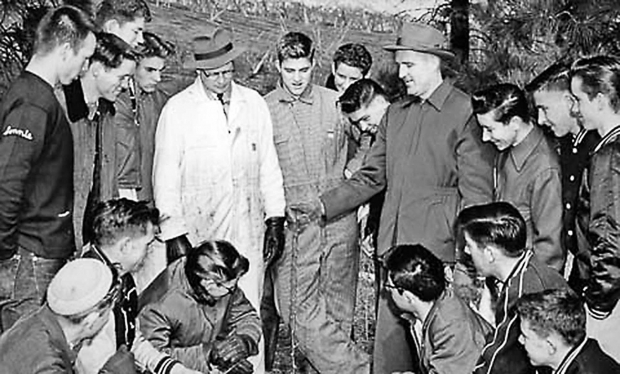
Dick Bartram (wearing the dark coat and hat) was an authority on orchard economics. Here, he explains how to get new trees off to a good start. Washington State University
Retired Washington State University Cooperative Extension agent Richard “Dick” Bartram, who was an authority on apple maturity and storage, died February 19, aged 94.
Bartram was born in Chelan, Washington, and grew up on the family orchard. He graduated from Washington State College in 1943 with a bachelor’s degree in horticulture. He joined the U.S. Army and served in the South Pacific and occupied-Japan during World War II.
After leaving the Army in 1946, he was hired as a horticultural extension agent for north central Washington, based in Wenatchee. In 1965, he earned a master’s degree in economics from Oregon State University.
Mike Scott, owner of Martin Scott Winery in East Wenatchee, worked as an extension agent with Bartram in the early 1970s and said Bartram was able to cross political lines in the industry.
“He was widely recognized as a leader in the fruit industry, and he was a unifying force for bringing key people together and getting people to move ahead for the good of the industry in general rather than for the good of their own personal lives or farms,” he recalled.
Bartram was knowledgeable about fruit storage and refrigeration technology and concerned that the industry had too many apples to sell after the first of the year, Scott recalled. Controlled-atmosphere storage was still relatively new to the industry, and Bartram helped the industry learn, with the help of much research that was going on, how best to store the different apple varieties.
Kirk Mayer, retired manager of the Washington Growers Clearing House Association, said Bartram was an impressive figure in the industry and someone who was needed.
“He really opened our eyes to how poorly we were delivering our fruit,” Mayer recalled.
Bartram very effectively brought research information from the scientists and helped growers and horticulturists to apply it in the field, Mayer said. “He was a connection, and he kept growers up to speed with new developments throughout the world. It wasn’t just research done by WSU.”
Don Van Wechel, a former field horticulturist at the Blue Chelan cooperative in Chelan, said when he was new to the industry, Bartram was an important source of information, particularly on the economic aspects of fruit growing.
Bartram established the Apple Maturity Program in an effort to improve the quality of stored fruit and ultimately grower returns. The apple grading system rewarded growers for the color and size of the fruit, but color had little to do with storability, Van Wechel said. The program brought together research, extension, and warehouse personnel. Horticulturists representing two-thirds of Washington’s apple production met weekly from August through the end of harvest to identify the ideal time to harvest apples for long-term storage.
In 1959, Bartram received a distinguished service award from the National County Agricultural Agents Association.
In 1982, the year after he retired, he was named the Apple Blossom Festival’s Apple Citizen of the Year. He was inducted into the WSU 4-H Hall of Fame in 2006 in recognition of his many years of work with 4-H.
Van Wechel said Bartram’s career and life were devoted to public service, and he formed close bonds with many in the tree fruit industry. He was polished, refined, a man of honor, and a man of his word.
“And maybe that’s why I think of Dick Bartram as a teacher, a friend, and most of all a gentleman,” Van Wechel said. “There are few men I hold as high.”
Bartram is survived by his sons Ronald and Bruce Bartram. He was preceded in death by his wife, Lorne, and son William Charles Bartram.






Leave A Comment